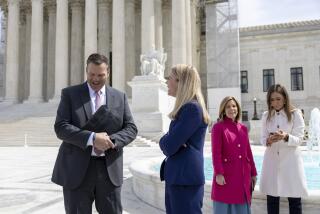Divorced Woman Can’t Use Fertilized Eggs, Court Rules
- Share via
ALBANY, N.Y. — Five frozen, fertilized human eggs that have been in legal limbo since the couple who created them divorced must be donated to research despite the woman’s desire to use them to have children, the state’s highest court ruled Thursday.
The Court of Appeals’ unanimous decision upholds a contract Maureen and Steven Kass signed before completing in-vitro fertilization in 1993.
The couple split after the attempt to have a child failed. Maureen Kass then decided that she wanted to use her eggs to try to get pregnant, saying she had never given up hope of having children.
Her husband objected, saying he did not want to have a child by his former wife, and she sued.
For years, courts in various states have been wrestling with the question of who owns frozen embryos after a divorce, but Thursday’s decision was the nation’s first based on a contract signed by the couple involved, said Maureen Kass’ lawyer, Vincent Stempel.
Stempel said no decision had been made on whether to appeal.
“We’re bitterly disappointed,” he said.
Maureen Kass, 39, could not have children naturally because, while in her mother’s womb, she was exposed to the drug DES, which is known to cause serious problems during pregnancy and delivery. In 1993, her sister agreed to be impregnated with one of the artificially inseminated eggs, but the procedure failed.
The contract the Kasses signed, which said they wanted the eggs donated to research and ultimately destroyed if they decided not to go through with a pregnancy, is not mandated by law but is recommended by the American Society for Reproductive Medicine
Dr. Benjamin Younger, the executive director of the Birmingham, Ala.-based organization, said Thursday’s ruling should persuade couples going through test-tube fertilization to decide first what they want done with the eggs if they separate.
A trial judge originally ruled in Maureen Kass’ favor, but that decision was overturned on appeal and eventually made its way to the high court.
Although exact figures are unavailable, experts estimate there are 20,000 frozen embryos subject to dispute across the country. In all, there are an estimated 100,000 embryos in storage nationwide.
More to Read
Sign up for Essential California
The most important California stories and recommendations in your inbox every morning.
You may occasionally receive promotional content from the Los Angeles Times.










